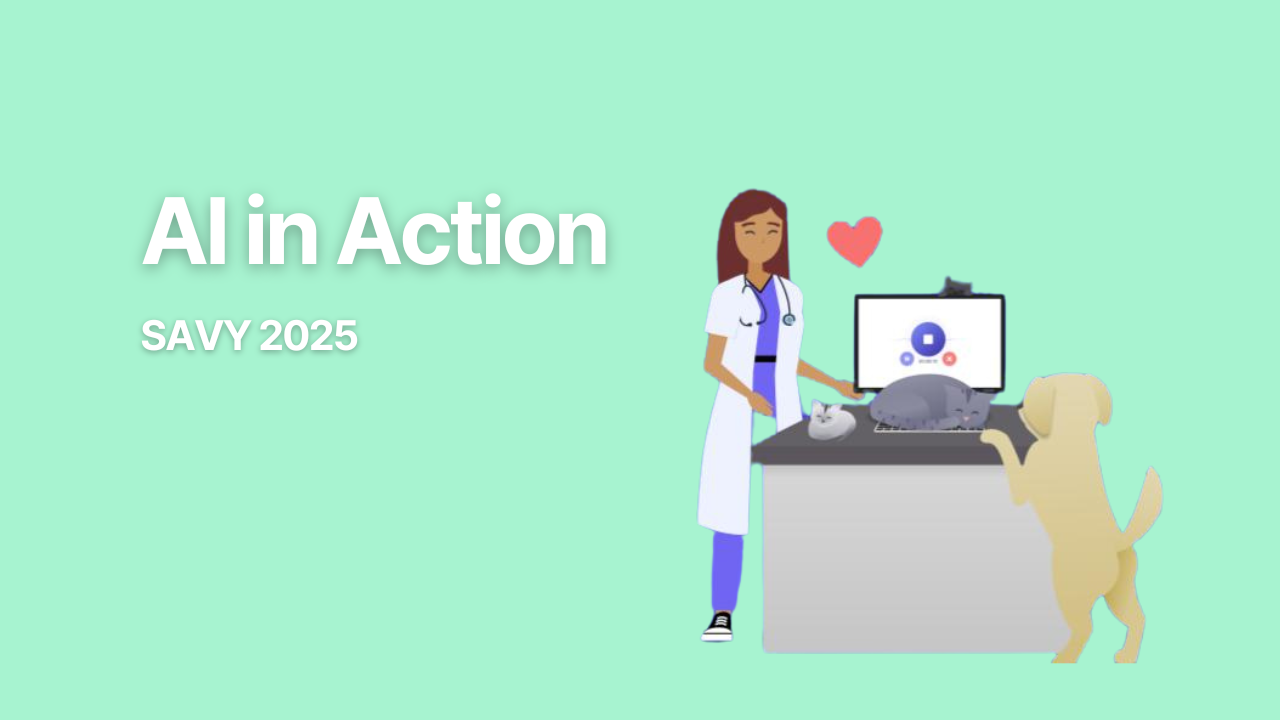Receive $200 towards patient care when you refer a licensed DVM to Scribenote Pro! More details →
July 18, 2025

To watch Allie Aspden's live presentation From Burden to Breakthrough at SAVY 2025 visit our YouTube.
When Allie Aspden took the stage at SAVY, she didn’t come as someone working in the AI space. She came as someone who had lived the realities of veterinary medicine firsthand. For nine years, she worked as a veterinary technician, dreaming of becoming a vet herself. But over time, she began to notice something deeply troubling.
“Watching a lot of the doctors around me just drown in light of everything going on” she told the audience. “not because they didn't love the work they were doing — but they were just overwhelmed.”
Sixteen-hour shifts. Missed meals. Missed moments with family. And the quiet, constant question: Is this really for me?
Eventually, Allie found herself asking the same question. Unsure if she could build a future in veterinary medicine, she stepped into human healthcare as a medical scribe—a role focused on writing real-time medical records so doctors could focus entirely on their patients.
It was a revelation.
“I noticed the impact right away. The doctors were present. They were connected with their patients.” Allie said. “And so I thought—why don’t vets have this?”
Allie pitched the idea of vet scribes to a hospital she was working in, and while they supported her becoming a scribe they didn't see the benefits of scaling it to support more than one doctor.
But Allie couldn’t shake the idea.
In 2020, she joined VEG (Veterinary Emergency Group), and pitched the concept again—this time to the company’s founders. They agreed to let her try, if she put her dreams of furthering her education on hold. Allie said yes.
In just six months, the pilot program launched in three of VEG’s busiest hospitals. Three years later? Over 150 scribes in 40+ hospitals across 21 states. More than 350 doctors supported.
But Allie is quick to highlight: “There’s a lot of reasons why our team was able to succeed, and I think the biggest one is that we understood what many of these other companies didn't — what doctors care about.”
While the success of VEG’s scribe program was celebrated, Allie realized that human scribe programs are not sustainable for the average hospital. Scribes are expensive, running at about $20-25/hour. She said: “While it was fantastic to support hundreds of doctors, we wanted to find a way to do more.”
In 2023, Allie met Ryan and Alina—the co-founders of Scribenote. It was immediately clear that they weren’t just building an AI scribe company. They were trying to help Ryan’s sister, Katie, a veterinarian struggling under the same burden Allie knew so well.
“They understood the need.” Allie said. “And they created a solution.”
Together with Scribenote, Allie found a way to scale scribe support—affordably and accessibly—using AI. “That’s what sets us apart.” She continued. “We understand the core of our mission here —To not only make our systems more efficient, but to understand and honour the people that are inside of them.”
Across five different hospitals, Scribenote saved over 90 minutes spent on medical records, per doctor, per day. They also found that doctors were able to table about 1.5 more cases added to their daily schedule.
Scribenote’s success wasn’t about numbers. It was about people.
Allie shared one story in particular of a hearing impaired doctor. He connected with patients through facial expressions and body language and after using a scribe, he finally had the ability to do that and his notes weren’t suffering. This solution meant he no longer had to choose between connection and documentation.
Another email came from a seasoned doctor with anxiety. After working with a scribe, they wrote:
“My anxiety about cases walking through the door turned to enthusiasm to see more cases and help more pets. I had FUN. Instead of feeling overwhelmed by being busy, I felt energized by it.”
An important takeaway for Allie from these stories is: ”If we want AI to have a future in this field, it has to serve the people first, and not the spreadsheet.”
Allie ended on a note to her peers in the veterinary space. “Find your mission in this field — and solve all of the problems we are facing”. “This is about building a future where care is sustainable to everyone who gives it and that’s why automation matters.”